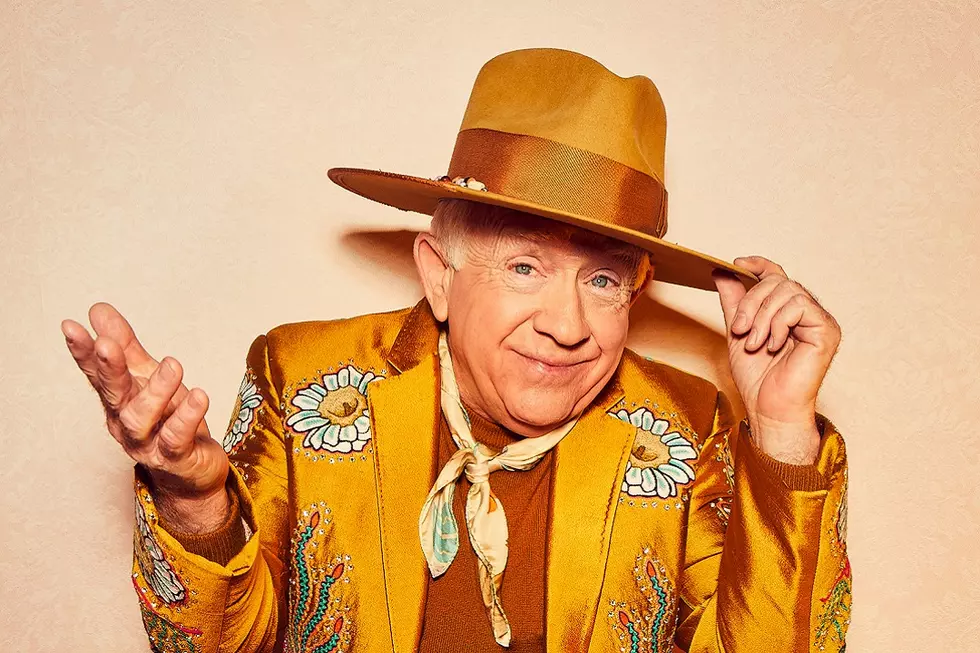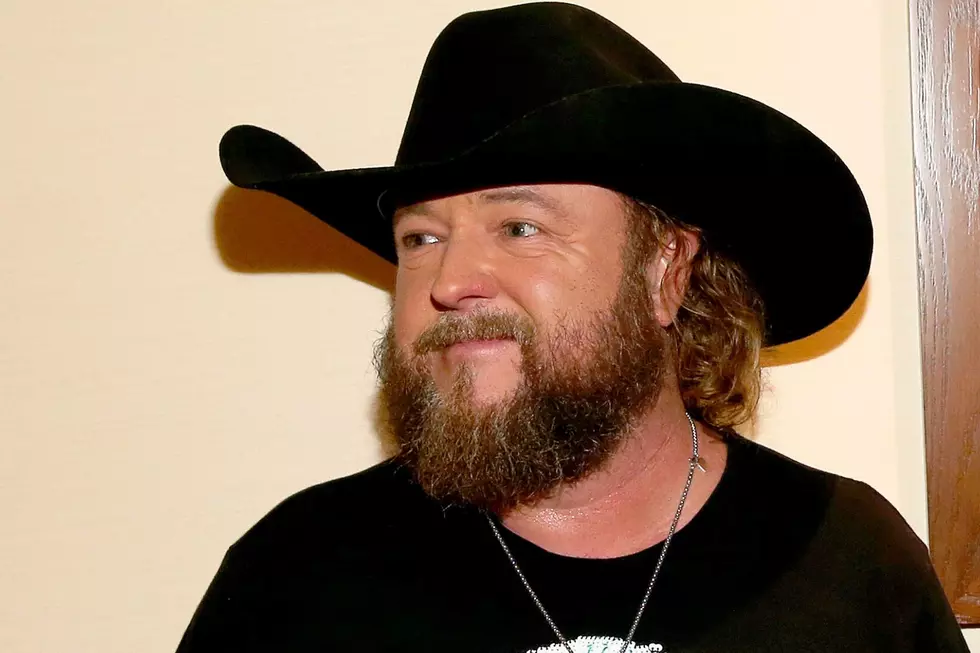
Interview: Leslie Jordan’s ‘Company’s Comin” Is Gospel Music for Everyone
Actor Leslie Jordan became a social media sensation during the COVID-19 pandemic, thanks in part to his Sunday Mornin' Hymn Singin' series, which finds the 65-year-old performing classic gospel songs with his friend, singer-songwriter Travis Howard, on Instagram. It's those sessions that directly sparked the idea for Jordan's new album, Company's Comin', but the inspiration for the project (out Friday, April 2) goes back so much further.
Howard — a small-town Georgia native who moved to Los Angeles from Nashville in the late '90s — met Jordan around the turn of the millennium.
"I was young and so excited to be in Hollywood, and I was just making friends with anybody that seemed like me. So I heard that Southern accent and I was like, 'Yes, okay, this is one of my tribe,'" Howard recalls.
It was an impressive group, initially drawn together, Howard says, "based on nothing but Southerness": In addition to Howard and Jordan — a Chattanooga, Tenn., native himself who by then was well known for his role as Beverley Leslie on the NBC comedy Will & Grace — the crew included Jackson, Miss.-born filmmaker and actor Tate Taylor (later an Academy Award nominee as director of The Help) and future award-winning actor Octavia Spencer, from Montgomery, Ala.
Howard, who co-produced Company's Comin' with Danny Myrick, a fellow singer and songwriter originally from the gulf coast of Mississippi, was the only straight white man among the bunch, and he came from "a really rigid, religious South."
"We were really — there's no other word to say but 'homophobic.' I grew up pretty racist, pretty homophobic — or, in that environment," Howard admits. And yet, he found himself bonding with two gay men and a Black woman, all far from home on the West Coast.
"I have these really rich memories [of my childhood], and they were all wrapped up in this very Southern accent and this very masculine-type of way of speaking with a Southern accent," Howard explains. "When I heard Leslie's voice ... he has that same voice of, like, my grandparents and my uncles and my aunts ... and it just brings back my history and my past and my childhood without bringing back all the, you know, 'Shut up, boy!' All that stuff is gone. And it's great — it's freeing."
Years ago, Jordan floated to Howard the idea of a comedic musical about tent revival evangelists. Howard, in turn, called Myrick, who's written hits for Jason Aldean, Tim McGraw and others, but grew up singing and playing in his family's gospel band and in church.
The two both "adore Southern harmonies," Howard says, and "speak that language," so they were totally game. The musical hasn't gotten off the ground yet, but when Jordan proposed making a gospel album, Howard knew just who to ask for help.
"It's just so simple, going back into that musical base, for he and I," Myrick says. They started compiling a list of familiar and favorite hymns, looking for songs that were spiritual but not "too aggressively theological," and curated a wishlist of collaborators, matching them to potential songs. "Yes"es were pretty easy to come by, he adds, recalling how the other artists expressed admiration for Jordan and his joyful digital work during the pandemic.
Seven of the 10 songs on Company's Comin' are traditional hymns, but Howard and Myrick co-wrote "The One Who Hideth Me," which Jordan sings with Pearl Jam frontman Eddie Vedder, and they each penned the songs they sing with Jordan: "The Longest Day" and "In All Things," respectively.
"Not one artist [asked], 'Can I do something else? Can we change the key? Can we try a different arrangement?'" Myrick adds. "Everybody rolled with it and just slayed it."
Jordan's duet partners also include, among others, Brandi Carlile, Dolly Parton, Tanya Tucker and Brothers Osborne's T.J. Osborne, whose voice Howard describes as "like chocolate butter." (Jordan and his crew selected Osborne as a collaborator before he publicly came out as gay in early February.) Katie Pruitt and Ashley McBryde and Charlie Worsham are there, too — the latter of whom cut up with Jordan on "Workin' on a Building."
"I still have fond, fond memories of these pentecostal preachers ... just going on and talking, and the euphemisms and colloquialisms that southern people use are just somehow so familiar even if you haven't heard 'em before, and Leslie had a lot of those," says Howard of capturing Jordan's personality so vividly on each track, "so when we started doing his vocals, I would encourage [that] ... 'Just try to be yourself; just try to let things go' ..."
"As we got into the record, I was like, 'Alright, the more we can do of this and make the other artists feel more at home and feel more like, 'You know what, don't take it too seriously. Enjoy yourself,' the better it will be,'" Howard adds. "I really wanted it to feel like a pentecostal church service ... stuff that you would do in a small, cinderblock church in a tiny town."
Then there's "Farther Along," featuring Chris and Morgane Stapleton. Both Howard and Myrick cite the track — the final song on the album — as one of their favorites for its build: from Jordan singing solo over a simple melody, to Morgane joining in on harmonies and taking her own verse, to Chris harmonizing with her, to an interlude of horns, to, finally, Chris absolutely letting loose on the final chorus.
"It's topped off with, like, you know, King Triton surfing two dolphins on the top," Howard says. Adds Myrick, "It kills me ... It's unbelievable ... We had in our mind what he's going to do, because we know his voice so well, but we got the track back and it was like, 'Oh my God.' It's just this thing he does that nobody else can do."
Sessions for Company's Comin' took place in both Los Angeles and Nashville; some artists recorded their parts remotely. Despite the challenges of making music during a pandemic, though, Jordan, Howard and Myrick worked to craft an album that feels welcoming — not only as though it was recorded in a more communal sort of way than COVID-19 guidelines would allow, but also as though anyone can enjoy it.
In his bio for the project, Jordan says that performing the hymns "felt like I was recapturing the joy of what this music meant to me as a kid, but without all the baggage." He adds, "When I was growing up, I wanted so badly to be a good Christian, but I knew that the church would never accept me for who I was. It’s liberating now to come back to these hymns, completely at peace with myself, and sing without any hint of the guilt or shame I felt in my youth."
Though neither Howard nor Myrick had to grapple with being both gay and religious, they can relate to those emotions of shame and guilt. "I'm certainly one of those that was really knee-deep in it and has seen my theology and worldview change," muses Myrick, "... so these songs, while being really nostalgic to me as a kid growing up, also had begun to represent a pretty divisive and close-minded theology that was harder and harder for me to carry out the more I met a more diverse group."
"Going back to the songs and reimagining them with the incredible singers that we got to reimagine them with ... really for sure reclaims just the love of that music for me," he adds.
The first thing listeners will hear when the press play on Company's Comin' is Jordan's voice, all alone, singing: "This little light of mine ..." The album ends, then, with the sounds of an in-studio gathering as Jordan comes back to the mic and sings once again: "Cheer up, my brother ..."
"So the whole thing is this very, very personal, internal message to everybody," Howard explains, "that maybe it's time to not throw the baby out with the bathwater when it comes to religion and the new ways that we're understanding things like sexuality and gender and whatever, whatever, whatever.
"It's like, somehow, cleansing the way that we grew up of all of the thorns and the briars and stickers," he concludes, "and making it again welcoming for everybody."
More Country Albums Coming in 2021:
More From Taste of Country






![Kellie Pickler Honors Late Husband Kyle Jacobs in Return to the Stage: ‘I Know He Is Here With Us Tonight’ [Watch]](http://townsquare.media/site/204/files/2024/04/attachment-kellie-pickler-kyle-jacobs-tribute.jpg?w=980&q=75)


